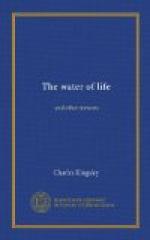The East—and indeed the West likewise—was haunted by dreams of a Water of Life, a Fount of Perpetual Youth, a Cup of Immortality: dreams at which only the shallow and the ignorant will smile; for what are they but tokens of man’s right to Immortality,—of his instinct that he is not as the beasts,—that there is somewhat in him which ought not to die, which need not die, and yet which may die, and which perhaps deserves to die? How could it be kept alive? how strengthened and refreshed into perpetual youth?
And water—with its life-giving and refreshing powers, often with medicinal properties seemingly miraculous—what better symbol could be found for that which would keep off death? Perhaps there was some reality which answered the symbol, some actual Cup of Immortality, some actual Fount of Youth. But who could attain to them? Surely the gods hid their own special treasure from the grasp of man. Surely that Water of Life was to be sought for far away, amid trackless mountain-peaks, guarded by dragons and demons. That Fount of Youth must be hidden in the rich glades of some tropic forest. That Cup of Immortality must be earned by years, by ages, of superhuman penance and self torture. Certain of the old Jews, it is true, had had deeper and truer thoughts. Here and there a psalmist had said, ‘With God is the well of Life;’ or a prophet had cried, ’Ho, every one that thirsteth, come ye to the waters, and buy without money and without price!’ But the Jews had utterly forgotten (if the mass of them ever understood) the meaning of the old revelations; and, above all, the Pharisees, the most religious among them. To their minds, it was only by a proud asceticism,—by being not as other men were; only by doing some good thing—by performing some extraordinary religious feat,—that man could earn eternal life. And bitter and deadly was their selfish wrath when they heard that the Water of Life was within all men’s reach, then and for ever; that The Eternal Life was in that Christ who spoke to them; that He gave it freely to whomsoever He would;—bitter their wrath when they heard His disciples declare that God had given to men Eternal Life; that the Spirit and the Bride said. Come.
They had, indeed, a graceful ceremony, handed down to them from better times, as a sign that those words of the old psalmists and prophets had once meant something. At the Feast of Tabernacles—the harvest feast—at which God was especially to be thanked as the giver of fertility and Life, their priests drew water with great pomp from the pool of Siloam; connecting it with the words of the prophet: ‘With joy shall ye draw water out of the wells of salvation.’ But the ceremony had lost its meaning. It had become mechanical and empty. They had forgotten that God was a giver. They would have confessed, of course, that He was the Lord of Life: but they expected Him to prove that, not by giving Life, but by taking it away: not




